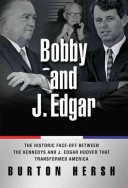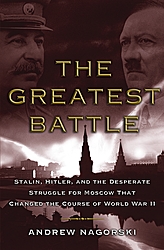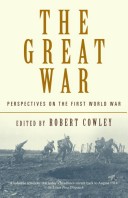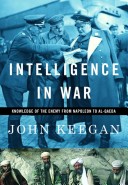Here’s a selection of books that I am reading as I prep for my upcoming U.S. History B classes.
 Bobby and J. Edgar: The Historic Face-Off Between the Kennedys and J. Edgar
Bobby and J. Edgar: The Historic Face-Off Between the Kennedys and J. Edgar
By Burton Hersh
Published 2007
Carroll & Graf
Hardcover, 624 pages
ISBN 0786719826
Formerly a journalist who covered politicians such as the Kennedys, Burton Hersh chronicles the relationship between J. Edgar Hoover and his nominal boss, Attorney General Robert Kennedy. With the plethora of Kennedy books out there, where this one will land is yet to be determined. It is an interesting read thus far and has had some fairly good reviews on other sites. I do worry that Hersh’s journalist background hurts the book as he seems enamored with legends, rumors, and conspiracies. But we will see.
The Greatest Battle: Stalin, Hitler, and the Desperate Struggle for Moscow That Changed the Course of World War II
By Andrew Nagorski
Simon & Schuster, September 2007
Hardcover, 384 pages
ISBN-10: 0743281101
 Students typically enter my U.S. History B class believing that the United States, with some help from England, won World War 2. When I start to work my way into the narrative, the events leading up to the war’s outbreak, students are often surprised by the vicious and massive slaughter that took place on the Eastern Front.
Students typically enter my U.S. History B class believing that the United States, with some help from England, won World War 2. When I start to work my way into the narrative, the events leading up to the war’s outbreak, students are often surprised by the vicious and massive slaughter that took place on the Eastern Front.
Andrew Nagorski’s “The Greatest Battle: Stalin, Hitler, and the Desperate Struggle For Moscow that changed the Course of World War II,” is a great read in its detail and its brevity. The nature of the conflict as Hitler invaded Russia and as an almost hapless Stalin blundered his way through the open stages of the fight, leaves you bewildered and baffled. Hitler’s obtuse generalship probably cost him the prize, Moscow. His army started its campaign a month late, Hitler would slow it down for other objectives, and ultimately the campaign would stall within sight of Moscow. Seven million troops fought, 2.5 million were casualties, and millions more civilians, would all pay the price as two brutal and asinine leaders played a game of pride with human life. Two dictators who with sheer terror and relentless slaughter pounded each other until the very end. It is not an exaggeration to say the war was won and lost in the East before we ever got there.
Drawing on recently declassified documents from Soviet archives, including the files of the NKVD, along with accounts of survivors and of children of top Soviet military and government officials, and reports of Western diplomats and correspondents, “The Greatest Battle” illuminates the full story of this titanic clash.
 I wanted to be a little stronger with my World War I unit, so I havea few excellent books that I think will help me some. Robert Cowley is the editor of The Great War: Perspectives on the First World War, which so far is an excellent, informative, and smooth read. The essays are impressive and flow from one to the next nicely. Cowley has brought together thirty articles in this book to examine the unnecessary but perhaps inevitable war in its diverse aspects. A number of the subjects covered here are not just unfamiliar but totally fresh. Who originated the term “no-man’s-land” and the word “tank”? What forgotten battles nearly destroyed the French Army in 1915? How did the discovery of a German naval codebook bring the United States into the war? I also received a re-print copy of C.R.M.F. Cruttwell’s 1932 book, A History of the Great War: 1914-1918, from Academy Chicago Publishers, which I am so far pleasantly surprised with; though the writing style is a bit dry for me. But by far, David M. Kennedy’s Over There: The First World War and American Society, is the key book and has provided me with more notes and antidotes. I have had this copy for some time and have just now begun to read it indepth. Kennedy is a master historian and covers the political and social aspects of WWI for Americans marvelously.
I wanted to be a little stronger with my World War I unit, so I havea few excellent books that I think will help me some. Robert Cowley is the editor of The Great War: Perspectives on the First World War, which so far is an excellent, informative, and smooth read. The essays are impressive and flow from one to the next nicely. Cowley has brought together thirty articles in this book to examine the unnecessary but perhaps inevitable war in its diverse aspects. A number of the subjects covered here are not just unfamiliar but totally fresh. Who originated the term “no-man’s-land” and the word “tank”? What forgotten battles nearly destroyed the French Army in 1915? How did the discovery of a German naval codebook bring the United States into the war? I also received a re-print copy of C.R.M.F. Cruttwell’s 1932 book, A History of the Great War: 1914-1918, from Academy Chicago Publishers, which I am so far pleasantly surprised with; though the writing style is a bit dry for me. But by far, David M. Kennedy’s Over There: The First World War and American Society, is the key book and has provided me with more notes and antidotes. I have had this copy for some time and have just now begun to read it indepth. Kennedy is a master historian and covers the political and social aspects of WWI for Americans marvelously.
Mark Moyer’s Triumph Forsaken: The Vietnam War, is a book that breaks the mold for your typical Vietnam history. Moyar challenges a lot of the common held beliefs concerning our strategy and military leadership during the war, he goes so far as to say that the war was “a worthy but improperly executed enterprise.”
Finally, John Keegan’s Intelligence in War: Knowledge of the Enemy from Napoleon to Al-Qaeda. This book is really more for my interest, but will also offer some excellent talking points during my classes. Keegan brings to life the split-second decisions that went into waging war before the benefit of aerial surveillance and electronic communications.